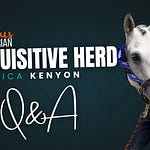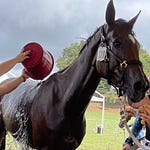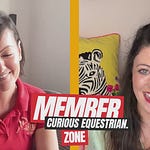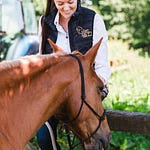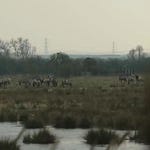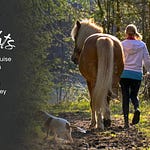Deep Dive
Guest: Amy Cullen, former attorney turned head wrangler at C Lazy U Ranch, Colorado
Key Topics: Career transitions, ranch horse management, wildfire evacuations, therapeutic writing
Amy's story begins with a question many of us recognise: you've worked hard, earned well, bought the horses, so why aren't you happy? Her answer was radical enough to make friends question her sanity. Trade a six-figure legal salary for $7 an hour mucking stalls across 8,200 acres of Colorado ranch land.
The economics seemed mad. The outcome suggests otherwise.
The Big Takeaway
The most compelling aspect of Amy's story isn't the dramatic career change or even evacuating 200-plus horses from wildfire. It's her brutal honesty about the grinding reality of maintaining horses whilst climbing the corporate ladder.
"I was lucky if I saw a horse," she admits, describing weeks lost to traffic jams between her law firm and Maryland stables. You work harder to afford the thing that brings you joy, only to have no time for joy. Sound familiar?
Amy's solution was extreme, but her recognition of the problem is universal. How many of us are trapped in this same contradiction?
Three Things That Stood Out
1. "Everything I thought I knew was a small fraction of what these horses taught me"
Amy arrived with decades of English riding experience. Managing 200 horses living as a herd required completely different skills. The humility here is refreshing, no mystical horse whispering, just acknowledgment that the animals themselves were better teachers than formal instruction.
For riders stuck in single-discipline thinking, this perspective shift could be transformative. When did we start believing that arena work was the pinnacle of horsemanship?
2. The methodical genius of the wildfire evacuation
When the East Troublesome Fire threatened the ranch in October 2020, Amy's team didn't panic; they strategised. Understanding social dynamics became crucial: separate friend groups and horses become difficult to load. Put a confident lead mare on the trailer first and six geldings will follow without question.
Of 200-plus horses, fewer than half a dozen gave them serious trouble. This wasn't mystical connection, it was practical knowledge gained through daily observation. Which raises the question: how well do most horse owners actually know their animals beyond the riding relationship?
3. "If a horse looks like they're over being ridden by many guests, we rotate them"
Perhaps the most significant insight came from Amy's approach to horse welfare at a guest ranch. Rather than pushing tired or resistant horses through their jobs, the ranch system allows for career changes; guest horse to jingle horse to lesson horse, or comfortable retirement.
It's a model that challenges the industry standard of "use until useless." Why isn't this approach more widespread?
Deep Dive Analysis
What Amy's Story Reveals About Modern Equestrian Life
Amy's initial struggle exposes a fundamental flaw in how we've structured horse ownership around conventional career paths. We've created a system where the people most passionate about horses often can't afford the time to be with them.
The ranch model she describes offers an alternative worth examining. Instead of owning one or two horses requiring constant management, Amy works with 200 horses in a system designed around their natural behaviours. The horses live out year-round, develop genuine working relationships with humans, and have clear career progression.
But let's be honest, this model only works because paying guests subsidise it. Could similar approaches work elsewhere? And what does it say about our industry that the most progressive horse welfare often happens where economics align with animal wellbeing?
Beyond the Romance: What Ranch Life Actually Teaches
Strip away the Hollywood imagery and Amy's ranch experience offers practical lessons for any horse person. Daily exposure to herd dynamics revealed communication patterns impossible to observe in individual turnout systems.
Emergency veterinary care, field repairs, managing horses across varied terrain, all skills that formal riding instruction rarely covers. But perhaps most importantly, the ranch environment forced Amy to abandon perfectionism.
"I had to let go of being disappointed if I messed up," she reflects. In a world where many riders are paralysed by fear of making mistakes, this shift from performance anxiety to functional partnership deserves attention. Yet how often do riding instructors actively discourage this kind of perfectionism?
The Wildfire as Teacher
The evacuation story reveals something crucial about human-horse relationships under extreme stress. She knew which horses were friends, which were leaders, which were reliable under pressure.
This knowledge proved invaluable when time was critical and stakes were life-or-death.
Questions for Reflection
How well do you actually know your horse beyond what happens when you're riding? Amy's evacuation success depended on understanding social preferences and stress responses, knowledge that could prove crucial in any emergency.
What would happen if you stripped away the performance pressure from your riding? Amy describes rediscovering childhood passion when she stopped focusing on competition and started working with horses functionally. Where's the space for this kind of joy in modern equestrian culture?
If you could redesign your relationship with horses from scratch, what would it look like? Amy's dramatic career change worked for her specific circumstances, but the underlying question applies universally: are you living the horse life you actually want, or the one you think you should want?
Join the Conversation
Amy's story challenges the assumption that horse ownership must be expensive and time-consuming. Have you found ways to build meaningful relationships with horses outside traditional ownership models? Or are we all just trapped in the same economic contradiction?
Share your experiences in the comments below; especially if you've found solutions that don't require abandoning your career.
Running Free is available on Amazon and through Amy's website at runningfreehorses.com. A quick read that examines the gap between the lives we're supposed to want and the ones that actually fulfil us.
What resonated most with you from Amy's story? The career change, the wildfire evacuation, or something else entirely? And more importantly—what questions did it raise about your own relationship with horses?




